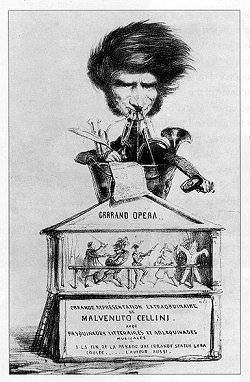Too difficult to perform in the 1830s, the failure of Benvenuto Cellini in Paris was a serious setback for Berlioz. It went against fashionable expectations of the day and the mixture, which tried to marry burlesque with serious themes, was against accepted taste, which favoured heroic melodramas. Even with goodwill towards the composer (in short supply at the time, partly perhaps because of his influence as a music critic) it was plain at Sunday's performance that the rhythmic intricacies and the opera's modernity would have been beyond the grasp of the orchestras and audiences of that time.
 Sir Colin Davis is a famed
Berlozian and he has embarked upon a twelve month Berlioz
Odyssey with the LSO, which began with some of the most exciting
orchestral playing heard at the Barbican for a long time. The large chorus
too was on splendid form and the sheer energy and evident commitment of all
concerned brushed aside all reservations about the work itself, which has
never achieved the popularity of the orchestral masterpieces.
Sir Colin Davis is a famed
Berlozian and he has embarked upon a twelve month Berlioz
Odyssey with the LSO, which began with some of the most exciting
orchestral playing heard at the Barbican for a long time. The large chorus
too was on splendid form and the sheer energy and evident commitment of all
concerned brushed aside all reservations about the work itself, which has
never achieved the popularity of the orchestral masterpieces.
London has become used to semi-staged concert performances of operas, and although there was little space for action at the front of the crowded platform the star singers, most of them from abroad, managed to convey differentiated character brilliantly with a few simple touches. Guiseppe Sabbatini, a heroic Italian tenor, dominated as the sculptor who became a fugitive, disguised as a friar, after fatally stabbing Richard Whitehouse (no relation to our own RW!), who hung in rigor mortis over his music stand until the end of the scene.
Robert Lloyd blustered as the father of Elizabeth Futral, exquisite to see & hear as his 17-year-old daughter. Laurent Nauori brought winning humour and vocal variety to the stock character of the elderly suitor who could not be permitted to marry her. Isabelle Cals, Orlin Anastassov (the Pope) and John Dobson (the comic innkeeper seeking payment for vast quantities of wine) all made their marks. By the end the bills were paid, the Cellini bronze had been cast, the sculptor forgiven and the ending was properly happy. Audibility was excellent, even though there was no orchestra pit and no attempt made to rein in the orchestra. All in all, a thrilling evening.
There were no dull patches that I noticed, and this great performance may prompt a revaluation of Benvenuto Cellini in the Berlioz canon. Indications, from the elaborate microphone set up at the Barbican, were that a live digital re-recording might be under way, as happened last month with Rinaldo. Meanwhile, Colin Davis's 1972 interpretation of Benvenuto Cellini is on Philips 416 955-2PH3.
No surtitles this time, but full texts and translations were provided, and the lights stayed on so that we could read them! Although I expect it to sound marvellous on my digital satellite radio (with no Optimod dynamic compression!) radio listeners will be at a serious disadvantage without the words.
Perhaps MotW & S&H might mount a campaign towards making texts available as a matter of course for all home listening? How little revenue would be lost if programme texts of operas and choral works were to be put on line, for downloading during a limited period before radio transmission? The difficulty in sorting out who is singing what surely makes many listeners switch off or over to TV?
Peter Grahame Woolf
 Return to:
Return to: